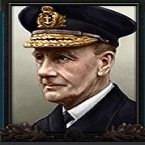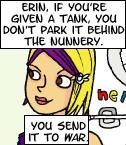patch1413
Posts: 9
Joined: 4/2/2011
Status: offline

|
My apologies for jumping all the way back here. And thanks for posting a thoughtful response - makes the debate much more pleasant.
1) Significant Fleet Escapes: The Dutch got out at Camperdown in the face of close blockade, the British being driven off station by weather and supply problems. The French got out at Toulon in January of 1805 and promptly went back in, not leaving for the Trafalgar campaign until March. The rebuilt Toulon fleet sortied briefly in 1808 or 1809. It didn't happen often, but it did happen. That the French never got much out of any of the escapes is why we play wargames - "What if?"
2) I'm well aware of the problems of moving a group of anything anywhere. The game give the Blockading British first shot and a +1 to damage. But right now that is ALWAYS what happens. You cannot, in EiA, simulate the Nile Campaign, or even Camperdown. France can't get out. Transports can't even get from Toulon to Malta in one turn, much less to Egypt. I use the 1 in 6 chance for two reasons - the first is that it was proposed in an old The General article, and two because we are only using a d6.
3) I should have been more specific - breaking the blockade just means you are at sea, along with the blockaders. There is still at least one interception roll in the area, plus another if you move away. It is intended as a calculated risk, not a given; again "What if?"
4) Napoleon's famous six hour quote was nonsense, even his army officers knew that (a small test landing on friendly shores drowned several hundred men), and I'm sure there were a lot sighs of relief when Austria attacked in 1805. The British navy ruled the waves, and no argument here, but only at tremendous cost in blood, treasure, and resolve, and unless the British are forced to consider the same problems I feel the naval game becomes a meaningless excercise in factor counting.
quote:
ORIGINAL: delatbabel
It's not true that a significant fleet of any size escaped a tight blockade at any time during the war between 1803 and 1815. There were many small fleets (10 or so ships) that did, also Brueys' fleet from Toulon in 1798 to its greater detriment, but one could argue that the British fleet there was stationed in the Gulf of Lyons sea area (and failed an intercept roll) and not actually in the Toulon blockade box.
From a sailing skipper's point of view, having piloted both square and sloop rigged ships into and out of a windy harbour under sail, I can tell you that no ship's captain would stand a chance of bringing a broadside around to an enemy fleet standing hove to close off the harbour and also be able to maintain sufficient steerage and control not to end up either in irons or on the rocks, either of which means death. Certainly not a 1 in 6 chance.
The other major problem when exiting a harbour, especially any river port, is that you do so bow first and in single file. An enemy fleet sitting "in the blockade box" is simply just going to pick off each ship one at a time as it leaves harbour. It's maybe a 1 in 50 chance of success if you try it, but it's a 49 in 50 chance of death if you try it and it doesn't work for you. So a blockade doesn't mean you can't sail, it just means that if you do sail you die, and your ships' captains don't all want to die.
In game terms allowing France a setup with 3-4 corps in Brest along with the entire French navy, and letting France have a 1 in 6 chance of breaking the blockade, forcing a British unconditional surrender and ending the game, would not fly with most players.
Napoleon said if that if the French were "masters of the Channel for six hours, we are masters of the world". The simple fact is that the French were never masters of the Channel and had no reasonable chance of becoming so.
_____________________________
|
 Printable Version
Printable Version






 no one will be interested in these especially doing away the Light ships!
no one will be interested in these especially doing away the Light ships! 







 New Messages
New Messages No New Messages
No New Messages Hot Topic w/ New Messages
Hot Topic w/ New Messages Hot Topic w/o New Messages
Hot Topic w/o New Messages Locked w/ New Messages
Locked w/ New Messages Locked w/o New Messages
Locked w/o New Messages Post New Thread
Post New Thread